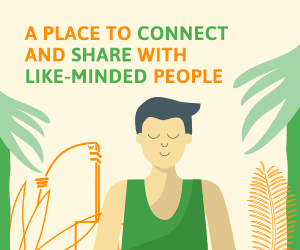Many of us struggle to find purpose or meaning in our lives, but as Dee Marques explains, it doesn't have to be such a challenge. From lifelong learning to developing your relationships, here are seven strategies on how to find meaning in your life.
The other day I was talking to a childhood friend about how much things have changed over the past few months. Leaving the negatives aside, we both agreed that we’re now a lot more focused on the things that matter. Suddenly, how to find meaning in life has taken centre stage in many of our worlds.
We’re not alone in this struggle to uncover meaning and purpose in our lives. A recent UK poll revealed that a staggering 90 per cent of people aged between 16 and 29 thought their lives had no purpose.
This feeling affects older adults too. Another survey claims that more than half of UK workers are unhappy in their current jobs and feel there could be better off pursuing another career. Similar figures exist in the USA. So, as you can see, lots of people sense that something is missing in their lives.
RELATED: Values and motivation – essential for meaning in life
In fact, how to find meaning in life is probably one of the oldest questions out there – and I'd wager that while many people discover the answer, just as many others don't! But discovering that meaning or purpose doesn’t always have to be the challenge that we often make it. Likewise, it doesn't have to involve grand gestures. You don’t need to take a sabbatical or spend weeks in a meditation retreat.
How to find meaning in life: avoid these traps
Nowadays we have many tools and resources to live happier lives. So why are so many people unhappy? For starters, finding happiness and finding meaning are related but not the same thing. Researchers found that happiness comes from meeting our needs, but the same can’t be said of purpose. You can have all your basic needs covered, even some extra luxuries, and still wonder what are you here for.
Searching for meaning is one of life's big challenges
So, when wondering how to find meaning in life, it’s important to understand that meaning doesn’t come from having or doing more things. Some of the things we do matter, others aren’t really important. Focusing on the ones that matter can bring purpose to our lives.
But don’t compare yourself to others. There are people who seem to have known what their life purpose was from the start. But they’re the exception and comparing ourselves to them can be frustrating. After all, finding meaning is a personal quest. And the comparison is unfair, because maybe there isn’t a “big” purpose for us, but rather a sense of purpose.
Seven practical ideas to find meaning in life
1. Pause
Finding meaning doesn’t have to involve grand gestures. You don’t need to take a sabbatical or spend weeks in a meditation retreat. Indeed, research by University of Missouri psychologist Laura King suggests the answer is already within ourselves (watch her below).
Take time to reflect on what being human means according to your experience so far. Think about the meaningful moments you’ve experienced, and ask yourself what values can be learnt from them. Then think about how to bring those values into your everyday life. But don’t overthink it. This will only cause stress, and can block your ability to enjoy the little things that give meaning to life. If you feel you’re overthinking it, pause, and take a moment to be mindful.
Pause to find meaning in life YouTube/Society for Personality and Social Psychology
2. Enjoy the journey
Author Robert Byrne says that “the purpose of life is a life of purpose”. Like millions of people out there, I’ve been looking for “the thing” that will give a deeper sense of purpose to my life. This has been going on for quite some time, and the truth is, I haven’t found it. But I’m not disappointed or stressed; in fact, it’s quite the opposite. The journey has been packed with discoveries, and has brought me closer to understanding that there’s no “one thing” that gives us purpose. Maybe there are many, or maybe the experience is what’s worthy in itself.
RELATED: Why happiness is a journey (not a destination)
3. Find your flow, find your centre
While on this journey, make a list of the small things that give you a deep sense of balance or personal satisfaction: your flow. Make an effort to be conscious of what brings you joy, and think about how you can turn those things into habits. Positive habits are important when learning how to find meaning in life, because they help us feel fulfilled.
4. Follow your talents
Maybe the things that make us feel centred are already there, but we’re not seeing them because we’re too busy or stressed. Here it may be useful to go back to consider your childhood. What did you want to be or do when you grew up?
“Discovering how to find meaning in life doesn’t always have to be the challenge that we often make it.”
Unfortunately, it seems we grow out of our dreams too often. You can also think about the things you enjoyed doing or were good at as a child. Maybe you were good at making people laugh, or at telling stories, or at building things with your hands. If these things were parked to the side, take some time to focus on them again and it could bring new meaning to your life.
5. Keep learning
If you still can’t see how to find meaning in life, perhaps you haven’t explored enough. Learning something new keeps us engaged and can open our eyes to skills or talents we didn’t know we had. In fact, so-called lifelong learning has been shown to have many benefits: to your health, employment possibilities, and also social and community advantages, which, in turn, can improve overall life satisfaction.
Keep learning to discover new purpose shutterstock/Speedkingz
You can take this even further: nourish a love for learning by learning about learning. In other words, think about how you can become more receptive to the lessons we can learn from everyday things. And always be willing to share what you learn – you never know who you will inspire.
6. If you were gone tomorrow…
Life is short and unpredictable, and this is one of the things that makes humans wonder what's the purpose of our existence. We’re here today but may be gone tomorrow, so finding a purpose and being remembered for our contribution is important to many of us.
If that's the case, what would you like to be remembered for? If you're feeling lost in life, thinking about what you would like to have inscribed on your tombstone can give you an insight into what you want to do in life, and therefore what could bring meaning to your life.
If this is too big a question, make it doable by imagining your life is split into seasons, just like the calendar year. What would you like to be remembered for during this season of your life?
7. Stronger relationships
Researchers have found a link between pro-social behaviour, compassion, and empathy and our ability to live happier and more meaningful lives. And there’s also evidence that a strong feeling of belonging increases meaningfulness. So make time every day to build deeper relationships with others.
One way to do this is through volunteering. Genuine altruism creates a sense of being worthy and useful. In other words, it gives us purpose. This happens because giving improves the quality of our relationships, and since we’re social beings, this reaffirms our purpose in life.
How to uncover meaning in life: look inside yourself
We all want to know how to find meaning in life – the good news is we don’t have to look far. Meaning and purpose are already within us. We only need to build a conscious appreciation for our surroundings, who we were, who we are, and our loved ones. This will give us a solid grounding that can help us make sense of the world and understand the role we play in it. ●
Main image: shutterstock/SSokolov
happiness.com | The fine art of being: learn, practice, share
Are you a happiness.com member yet? Sign up for free now to enjoy:
■ our happiness magazine with practical life tips
■ share and support others in our happiness forum
■ develop with free online classes in our happiness Academy
Written by Dee Marques
 A social sciences graduate with a keen interest in languages, communication, and personal development strategies. Dee loves exercising, being out in nature, and discovering warm and sunny places where she can escape the winter.
A social sciences graduate with a keen interest in languages, communication, and personal development strategies. Dee loves exercising, being out in nature, and discovering warm and sunny places where she can escape the winter.






Join the conversation
You are posting as a guest. If you have an account, sign in now to post with your account.